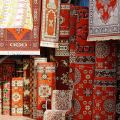The Different Types of Persian Rugs

The Persian rug is a rug rooted in the history of Iran. For centuries, the carpet has been an essential part of Iranian culture and art. However, since it is probably the most iconic rug in the world, many people don't know that there are many different styles and designs of Persian rugs, each with its own individual history and in some cases using weaving and knotting techniques.
Here at Qaleen, for example, we have Persian baluchi, suzani, hamedan, shiraz, tabriz, and moud rugs. In this post you’ll know a brief history about the history and design of some of these rugs. For a more general view of the history of the Persian carpet, you can see the post we have written previously here.

As you may already know, Persian handmade rugs of various types are woven by nomadic tribes, towns, and cities across Iran. Thus, the rugs from their respective places of origin have come to reflect the culture of the people through their various designs and patterns.
Persian Rug Tabriz
The Tabriz rug is hand knotted in the city of Tabriz in northwestern Iran. It is one of the oldest carpet weaving centers in the world and is famous throughout Iran.
The rug has one of the most diverse designs ranging from pictorial rugs, medallions, and even 3D shaped rugs. It is also known as one of the finest knotted rugs in the world, as its range of knots can go up to 110 raj (this is the number of knots per 7 cm width of the carpet).
Persian Keshan Rug
Keshan is a moderate-sized city located between Isfahan and Tehran, very close to the edge of the Dasht-e-Kavir desert. For centuries, the city was an important trading center located on the Silk Road.
Keshan rugs are handcrafted in and around the city. The rug is known for its high knot density with the Persian knot, while the warp and weft are made of cotton and the pile is of high quality wool. The rug is distinguished by its strikingly designed medallions, trees and figurative motifs, usually made in dominant colors such as blue, red and beige.
The famous Ardebil rug is a Keshan rug that is believed to have been made in the 16th century. It can still be seen in the Victoria and Albert museum in London.
Keshan rugs continue to have the same reputation for being well made and beautifully designed handmade area rugs.

